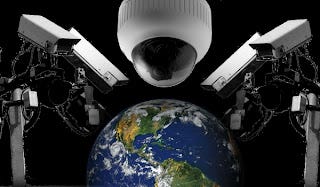Our governments surveillance strategy is "‘privileged and confidential,’ FBI says.

The President Barack Obama administration’s surveillance strategy in the wake of the Supreme Court’s decision that the installation of a GPS tracker on a vehicle amounted to a search under the Fourth Amendment remains “privileged and confidential,” the Justice Department claims in newly released memos.
What has been made public is that, following the high court’s Jan. 23 decision, the Federal Bureau of Investigation pulled the plug on some 3,000 GPS trackers. The bureau’s general counsel, Andrew Weissmann, acknowledged that fact while speaking at a legal symposium at the University of San Francisco last year.
He also said the government issued two memos on how to proceed following the so-called “Jones” decision — memos the government now claims are not for public consumption. What that boils down to is this: If the government told you how it was spying on you, it would have to kill you.
Consider:
A July 5, a 54-page memo the government just turned over to the American Civil Liberties Union via a Freedom of Information Act request, is completely redacted. The memo to Justice Department criminal chiefs and appellate chiefs is entitled “Guidance Regarding the Application of United States v. Jones, 132 S. Ct. 945 (2012), to Additional Investigative Techniques.” (.pdf)
Another 57-page memo, dated February 27 and sent to federal prosecutors, is entitled “Guidance Regarding the Application of United States v. Jones, 132 Ct. 945 (2012), to GPS Tracking Devices.” Most of that briefing is redacted other than a short review of the Supreme Court’s decision.
According to the ACLU, the withholding of the documents’ contents is “an unfortunate decision” that “leaves Americans with no clear understanding of when we will be subjected to tracking — possibly for months at a time.”
Catherine Crump, the ACLU’s lawyer on the topic, added that “Privacy law needs to keep up with technology, but how can that happen if the government won’t even tell us what its policies are?”
To be sure, the government has shown some of its cards in the followup litigation in the Jones case — a strategy judges appear willing to accept. In short, the government is shifting its focus to warrantless cell-tower locational tracking of suspects.
The Obama administration told a federal court in September that the public has no “reasonable expectation of privacy” in cellphone location data, and hence the authorities may obtain documents detailing a person’s movements from wireless carriers without a probable-cause warrant.
The administration, citing a 1976 Supreme Court precedent, said such data, like banking records, are “third-party records,” meaning customers have no right to keep it private. The government made the argument (.pdf) as it prepares for a re-trial of Antoine Jones, the previously convicted drug dealer whose life sentence and conviction was reversed last January by the Supreme Court. The high court found unanimously that the government’s use of a GPS tracker on his vehicle was an illegal search.
With the 28 days of vehicle tracking data thrown out of court, a federal judge in December agreed with the administration’s argument that it was legally in the clear to instead use Jones’ phone location records without a warrant.
The government wants those records to chronicle where Jones was when he made and received mobile phone calls in 2005. The records show each call the defendant made or received, the date and time of calls, the telephone numbers involved, the cell tower to which the phone users connected at the beginning and/or end of the call, and the duration of the call.
The authorities only had to show that such information was “relevant” to an investigation to get a judge to authorize Cingular to turn them over. No probable cause was needed.
That data was not introduced at trial, as the authorities used the now-thrown-out GPS data instead.
What’s more, the Obama administration claimed that the high court’s GPS decision was “wholly inapplicable” when it comes to cell-site data.
The administration noted that the high court said the physical act of affixing a GPS device to a vehicle amounts to a search and generally requires a warrant. “But when the government merely compels a third-party service provider to produce routine business records in its custody,” the government wrote, “no physical intrusion occurs, and the rule in Jones is therefore wholly inapplicable.”
http://www.wired.com/threatlevel/2013/01/fbi-surveillance-strategy/


